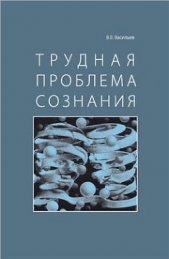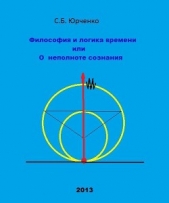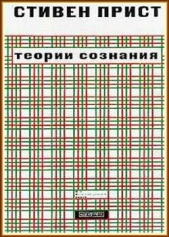Трудная проблема сознания

Трудная проблема сознания читать книгу онлайн
Книга посвящена обсуждению "трудной проблемы сознания" — вопроса о том, почему функционирование человеческого мозга сопровождается субъективным опытом. Рассматриваются истоки этой проблемы, впервые в четком виде сформулированной австралийским философом Д.Чалмерсом в начале 90-х гг. XX века. Анализируется ее отношение к проблеме сознание — тело и проблеме ментальной каузальности. На материале сочинений Дж. Серла, Д.Деннета, Д.Чалмерса и многих других аналитических философов критически оцениваются различные подходы к загадке сознания. В заключительной части книги автор предлагает собственное видение "трудной проблемы", позволяющее, с его точки зрения, избежать концептуальных тупиков и отдать должное интуициям здравого смысла
Внимание! Книга может содержать контент только для совершеннолетних. Для несовершеннолетних чтение данного контента СТРОГО ЗАПРЕЩЕНО! Если в книге присутствует наличие пропаганды ЛГБТ и другого, запрещенного контента - просьба написать на почту [email protected] для удаления материала
Шохин В. К. Психология, метафизика и немного компаративистики (о книге В. В. Васильева «История философской психологии. Западная Европа — XVIII век») // Вопросы философии. 2005. № 2. С. 158–165.
Шохин В. К. Философия ценностей и ранняя аксиологическая мысль. М.,
2006.
Эдмондс Д., Айдиноу Дж. Кочерга Витгенштейна: История десятиминутного спора между двумя великими философами. М., 2004.
Юлииа Н. С. Головоломки проблемы сознания: концепция Дэниела Деннета. М., 2004.
Юлина Н. С. Философский натурализм: о книге Дэниела Денне — та «Свобода эволюционирует». М., 2007.
Юм Д. Сочинения в 2 т. М., 1996.
Adams E. M. Mental causality // Mind 75 (1966). P. 552–563.
Akins К. Lost the plot? Reconstructing Dennett's multiple drafts theory of consciousness // Mind & Language 11:1 (1996). P. 1–43.
Aldrich V. C, Feigl H, Spatial location and the psycho‑physical problem // Philosophy of Science 2: 2 (1935). P. 256–261.
Alter T. The knowledge argument // The Blackwell Companion to Consciousness, ed. by M. Velmans and S. Schneider. Maiden, 2007. P. 396–405. Antony L. M. I'am a mother, Г worry // Content 6 (1995). P. 160–166.
Armstrong D. M. A Materialist Theory of the Mind. Rev. ed. L., 1993. Armstrong D. M. The Mind‑Body Problem: An Opinionated Introduction. Oxford, 1999.
Averill E., Keating B. F. Does interactionism violate a law of classical physics? // Mind 90 (1981). P. 102–107.
Ayer A. J. Language, Truth and Logic. 2 ed. N. Y., 1971 (1946).
Ayer A. J. The Central Questions of Philosophy. N. Y., 1976 (1973).
Ayer A. J. Part of My Life. Oxford, 1978 (1977).
Baars B. A Cognitive Theory of Consciousness. Cambridge, 1993 (1988).
Baars B. In the Theater of Consciousness: The Workspace of the Mind. N. Y.,
1997.
Baars B. The global workspace theory of consciousness // The Blackwell Companion to Consciousness, ed. by M. Velmans and S. Schneider. Maiden, 2007, P. 236–246
Baggini J. The Pig That Wants to Be Eaten: 100 Experiments for the Armchair Philosopher. N. Y., 2006 (2005).
Baker L. R. Metaphysics and mental causation // Mental Causation, ed. by J. Heiland A. Mele. N. Y., 1993. P. 75–95.
Bateson G. Steps to an Ecology of Mind. Chicago, 2000.
Bayne T. Phenomenology and the feeling of doing: Wegner on the conscious will // Does Consciousness Cause Behavior? Ed. by S. Pockett, W. P. Banks and S. Gallagher. Cambridge MA, 2006. P. 168–185.
Beattie J. An Essay on the Nature and Immutability of Truth in Opposition to Sophistry and Scepticism. 3 ed. L., 1772.
Beck L. W. The psychophysical as a pseudo‑problem // Journal of Philosophy 37; 21 (1940). P. 561–571.
Beckermann A. Analytische Einfuhrung in die Philosophie des Geistes. 2Aufl. В., 2000.
Bennett K. Mental causation // Philosophy Compass 2: 2 (2007). P. 316–337. Bennett M. et al. Neuroscience and Philosophy: Brain, Mind, and Language. N. Y., 2007.
Blackmore S. The Meme Machine. N. Y., 1999.
Blackmore S. Consciousness: An Introduction. N. Y., 2004 (2003).
Blackmore S. Destroying the zombic hunch. Review of Sweet Dreams by Daniel Dennett // Nature 5 (2005) P. 21–23.
Blackmore S. Conversations on Consciousness: What the Best Minds Think about the Brain, Free Will, and What It Means to Be Human. N. Y., 2006.
Blackmore S. Driving beyond consciousness: A test of multiple drafts theory // Toward a Science of Consciousness — Tucson 2006. P. 112–113.
Block N. Troubles with functionalism // Minnesota Studies in the Philosophy of Science 9 (1978). P. 261–325.
Block N. On a confusion about a function of consciousness // The Nature of Consciousness: Philosophical Debates, ed. by N. Block, 0. Flanagan, and G. Gtizeldere. Cambridge MA, 1997. P. 375–415.
Block N. The harder problem of consciousness // The Journal of Philosophy 99:
8 (2002). P. 319–425.
Block N. Review of Daniel Dennett, Consciousness Explained // Block N. Consciousness, Function and Representation: Collected Papers, Volume 1. Cambridge MA, 2007. 129–140.
Bricke J. Interaction and physiology // Mind 84 (1975). P. 255–259.
Bringsjord S., Noel R. Real robots and the missing thought‑experiment in the Chinese Room dialectic // Views into the Chinese Room, ed. by J. Preston and M. Bishop. N. Y., 2002. P. 144–166.
Broad С D. Mind and Its Place in Nature. L., 1925.
Campbell N. What was Huxley's epiphenomenalism? // Biology and Philosophy
16 (2001). P. 357–375.
Carruthers P. The Architecture of the Mind. N. Y., 2006.
Carruthers P. Higher‑order theories of consciousness // The Blackwell Companion to Consciousness, ed. by M. Velinans and S. Schneider. Maiden, 2007. P. 277–286.
Chalmers D. J. The first‑person and third‑person views. P. I. TS 1989. http://consc.net/notes/first‑third.html.
257Chalmers D. J. Consciousness and cognition. TS 1990. hitp://consc. net/papers/c‑and‑c.html.
Chalmers D. J. Toward a Theory of Consciousness. Ph. D. Thesis. TS 1993. Chalmers D. J. Absent qualia, fading qualia, dancing qualia // Conscious Experience, ed. by T. Metzinger. Paderborn, 1995. P. 309–328.
Chalmers D. The puzzle of conscious experience // Scientific American 273 (1995). P. 80–86.
Chalmers D. J. The Conscious Mind: In Search of a Fundamental Theory. N. Y., 1997(1996).
Chalmers D. J. Pacing up to the problem of consciousness // Explaining Consciousness — The "Hard Problem", ed. by J. Shear. Cambridge MA, 1997. P. 930.
Chalmers D. J. Moving forward on the problem of consciousness // Explaining Consciousness — The "Hard Problem", ed. by J. Shear. Cambridge MA, 1997.. P. 379–422,
Chalmers D. J. Availability: the cognitive basis of experience? // The Nature of Consciousness: Philosophical Debates, ed. by N. Block, О. Flanagan, and G. Guzeldere. Cambridge MA, 1997. P 421–424.
Chalmers D. J. On the search for the neural correlate of consciousness // Toward a Science of Consciousness II: The Second Tucson Discussions and Debates, ed. by S. R. Hameroff, A. W. Kaszniak, A. C. Scott. Cambridge MA, 1998. P. 219230.
Chalmers D. J. Materialism and the metaphysics of modality // Philosophy and Phenomenological Research 59(1999). P. 473–493.
Chalmers D. J. What is a neural correlate of consciousness // Neural Correlates of Consciousness: Empirical and Conceptual Questions, ed. by T. Metzinger. Cambridge MA, 2000. P. 17–40.
Chalmers D. J. Consciousness and its place in nature // Philosophy of Mind: Classical and Contemporary Readings, ed. by D. J. Chalmers. N. Y., 2002. P. 247–272.
Chalmers D. J. Ontological anti‑realism. TS 2007. http://consc. net/papers/ontology.pdf.
Chomsky N. A Review of B. F. Skinner's Verbal Behavior // Language 35: 1 (1959). P. 26–57.
Chomsky N. Recent contributions to the theory of innate ideas // Syntheses 17 (1967). P. 2–11.
Chomsky N. Reflections on Language. N. Y., 1975.
Chomsky N. New Horizons in the Study of Language and Mind. Cambridge,
2000.
Chomsky N. Turing on the "Imitation game" // The Turing Test: Verbal Behavior as the Hallmark of Intelligence, ed. by S. Shieber. Cambridge MA, 2004. P. 317–321.
Churchland P. M. Matter and Consciousness. Rev. ed, Cambridge MA, 1988. Churchland P. M. The Engine of Reason, the Seat of the Soul: A Philosophical Journey into the Brain. Cambridge MA, 1996 (1995).
Churchland P. M. Densmore and Dennett on virtual machines and consciousness // Philosophy and Phenomenological Research 59: 3 (1999). P. 763–767.
Churchiand P. M. Knowing qualia: A reply to Jackson (with Postscript 1997) // There's Something About Mary: Esays on Phenomenal Consciousness and Frank Jackson's Knowledge Argument, ed. by P. Ludow, Y. Nagasawa, and D. Stoljar. Cambridge MA, 2004. P. 163–178.

























